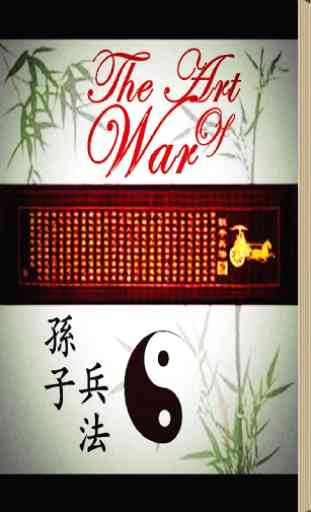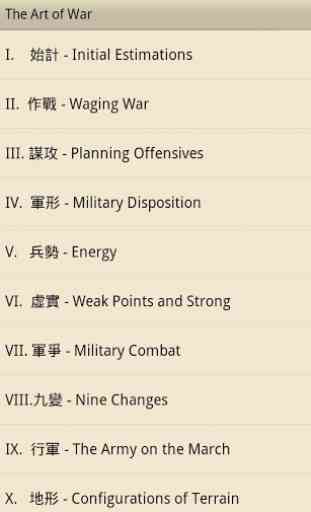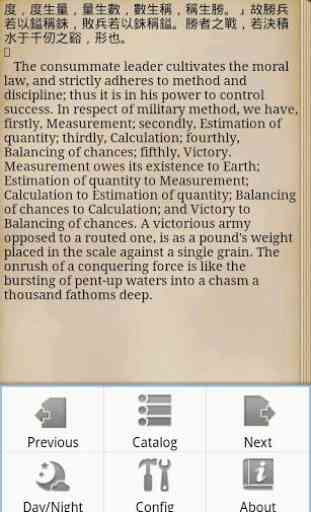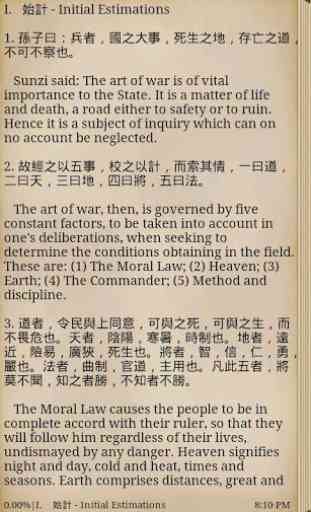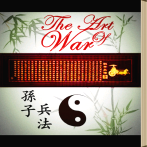The Art of War
The Art of War is an ancient Chinese military treatise that is attributed to Sun Tzu(also referred to as "Sunzi" and "Sun Wu"), a high ranking military general and strategist during the late Spring and Autumn period.
- No Ads -Book for Android devices
- Standalone Book App
- E-Reader device or additional app is not required
The Art of War is one of the oldest and most successful books on military strategy in the world. It has been the most famous and influential of China's Seven Military Classics: "for the last two thousand years it remained the most important military treatise in Asia, where even the common people knew it by name."It has had an influence on Eastern military thinking, business tactics, and beyond.
The Art of War has been applied to many fields well outside of the military. Much of the text is about how to fight wars without actually having to do battle: it gives tips on how to outsmart one's opponent so that physical battle is not necessary. As such, it has found application as a training guide for many competitive endeavors that do not involve actual combat.
The Art of War has also been applied in the world of sports. NFL coach Bill Belichick is known to have read the book and used its lessons to gain insights in preparing for games. Australian cricket as well as Brazilian association football coaches Luis Felipe Scolari and Carlos Alberto Parreira are known to have embraced the text. Scolari made the Brazilian World Cup squad of 2002 study the ancient work during their successful campaign.-----------------------------------------------Verses from the book occur in modern daily Chinese idioms and phrases, such as the last verse of Chapter 3:故曰:知彼知己,百戰不殆;不知彼而知己,一勝一負;不知彼,不知己,每戰必殆。So it is said that if you know your enemies and know yourself, you can win a hundred battles without a single loss.If you only know yourself, but not your opponent, you may win or may lose.If you know neither yourself nor your enemy, you will always endanger yourself.This has been more tersely interpreted and condensed into the modern proverb:知己知彼,百戰不殆。If you know both yourself and your enemy, you can win numerous battles without jeopardy.
- No Ads -Book for Android devices
- Standalone Book App
- E-Reader device or additional app is not required
The Art of War is one of the oldest and most successful books on military strategy in the world. It has been the most famous and influential of China's Seven Military Classics: "for the last two thousand years it remained the most important military treatise in Asia, where even the common people knew it by name."It has had an influence on Eastern military thinking, business tactics, and beyond.
The Art of War has been applied to many fields well outside of the military. Much of the text is about how to fight wars without actually having to do battle: it gives tips on how to outsmart one's opponent so that physical battle is not necessary. As such, it has found application as a training guide for many competitive endeavors that do not involve actual combat.
The Art of War has also been applied in the world of sports. NFL coach Bill Belichick is known to have read the book and used its lessons to gain insights in preparing for games. Australian cricket as well as Brazilian association football coaches Luis Felipe Scolari and Carlos Alberto Parreira are known to have embraced the text. Scolari made the Brazilian World Cup squad of 2002 study the ancient work during their successful campaign.-----------------------------------------------Verses from the book occur in modern daily Chinese idioms and phrases, such as the last verse of Chapter 3:故曰:知彼知己,百戰不殆;不知彼而知己,一勝一負;不知彼,不知己,每戰必殆。So it is said that if you know your enemies and know yourself, you can win a hundred battles without a single loss.If you only know yourself, but not your opponent, you may win or may lose.If you know neither yourself nor your enemy, you will always endanger yourself.This has been more tersely interpreted and condensed into the modern proverb:知己知彼,百戰不殆。If you know both yourself and your enemy, you can win numerous battles without jeopardy.
Category : Books & Reference

Related searches
